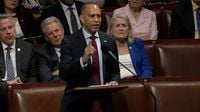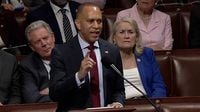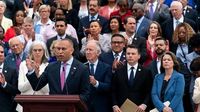House Minority Leader Hakeem Jeffries etched his name into congressional history on Thursday, July 3, 2025, by delivering the longest-ever speech on the House floor. Clocking in at an astonishing 8 hours and 44 minutes, Jeffries used his "magic minute" privilege to vehemently oppose President Donald Trump’s sweeping tax cut and spending bill, dubbed the "One Big Beautiful Bill Act." His marathon oratory, which began just before 5 a.m., effectively delayed a critical vote on the nearly 900-page package packed with Trump’s second-term legislative priorities.
Jeffries took to the floor early in the morning with a clear intention: to slow the legislative process and shine a spotlight on what he called the "one big ugly bill" that Republicans were pushing through with minimal debate. He lamented the fact that the GOP allotted only an hour of discussion for such a monumental bill, split into 30-minute segments between two committees, and declared, "I feel the obligation, Mr. Speaker, to stand on this House floor and take my sweet time to tell the stories of the American people." His words echoed throughout the chamber as he read heartfelt letters from Americans nationwide, many of whom depend on federal programs like Medicaid and the Supplemental Nutrition Assistance Program (SNAP).
Central to Jeffries’ speech was a fierce critique of the bill’s projected impact on healthcare. Citing the nonpartisan Congressional Budget Office, he warned that the Medicaid cuts and changes embedded in the legislation could strip health insurance from 11.8 million Americans over the next decade. "People will die," Jeffries declared solemnly. "I'm sad. I never thought I would be on the House floor saying this is a crime scene." He described the bill as an "all-out assault" on Medicaid, Medicare, the Children’s Health Insurance Program, the Affordable Care Act, and Planned Parenthood, emphasizing that it represented "the largest cut to health care in American history." The House Democratic leader underscored the human cost, sharing stories of seniors, children, veterans, and people with disabilities who would suffer from the bill’s provisions.
But Jeffries did not limit his opposition to healthcare alone. He also criticized the bill’s provisions on SNAP, immigration, and labor rights. He condemned the legislation as "reckless" and "immoral," arguing that budgets are moral documents meant to lift people up, not tear them down. "This reckless Republican budget is an immoral document," he insisted, calling on every member of the House to vote against it. His passionate denunciation drew applause from Democrats gathered near the podium, a show of solidarity against what they viewed as an attack on vulnerable Americans.
Throughout the speech, Jeffries made pointed references to the July 4 deadline President Trump had set to have the bill signed into law. "Donald Trump’s deadline may be Independence Day. That ain’t my deadline," he said emphatically. "We don’t work for Donald Trump, we work for the American people." His words highlighted the tension between the White House’s urgency and Democratic resistance on Capitol Hill.
As Jeffries’ speech stretched on, Republican members began to trickle out of the chamber. House Speaker Mike Johnson, who had been waiting to deliver his own remarks, eventually took the floor after Jeffries concluded. Johnson defended the bill vigorously, calling it "the people’s bill" and asserting that it fulfilled the promises of the "America First agenda." He dismissed Jeffries’ speech as mere "performance," stating, "Democrats deliver performances and Republicans deliver results." The Speaker’s remarks underscored the sharp partisan divide over the bill’s merits and the legislative process.
Despite Jeffries’ record-breaking effort, the bill passed the House later that day by a narrow margin of 218-214, moving swiftly to President Trump’s desk for signature. Republicans celebrated the victory as a major legislative achievement, while Democrats vowed to continue their opposition. Jeffries himself vowed to "take a chainsaw to Project 2025," signaling ongoing resistance to the administration’s agenda.
Jeffries’ speech was not just a procedural maneuver but a strategic moment for Democrats to unify their message and rally public opposition. Representative Teresa Leger Fernandez praised Jeffries on social media, saying he was "speaking truth on the House floor—breaking down exactly how the Republicans’ Big Ugly Bill will make regular Americans more hungry, sicker, and poorer." Other Democrats urged constituents to contact their GOP representatives to oppose the bill, emphasizing the stakes for working families and vulnerable populations.
Republicans, meanwhile, defended the bill as necessary reforms. House Majority Leader Steve Scalise argued that the legislation would reduce "waste, fraud, and abuse" in programs like Medicaid by imposing work requirements, which he claimed would help prioritize truly needy individuals. "If you’re disabled on Medicaid, right now you’ve been crowded out of those programs by people turning down work," Scalise said, framing the bill as a corrective measure. Yet, this perspective was sharply contested by Democrats, who warned that the bill’s cuts would close hospitals, especially in rural areas, and devastate health outcomes.
The "magic minute" tactic Jeffries employed is a House tradition allowing party leaders to speak for unlimited time after debate concludes, often used to delay votes or make symbolic stands. While it is not a filibuster like in the Senate, it serves as a powerful tool for minority voices to be heard. Jeffries’ marathon speech surpassed the previous record held by then-House Minority Leader Kevin McCarthy, who spoke for 8 hours and 33 minutes in 2021 to stall the vote on the Build Back Better Act. Before McCarthy, Nancy Pelosi held the record with an 8-hour and 7-minute speech in 2018.
Jeffries’ record-setting speech was a dramatic and historic moment on Capitol Hill, reflecting the fierce partisan battles shaping Washington politics in 2025. While it did not prevent the passage of the Republican bill, it underscored the deep divisions over the future of social safety net programs, healthcare, and tax policy in America. As the country grapples with these issues, Jeffries’ words and the stories he shared serve as a potent reminder of the human impact behind legislative battles.






